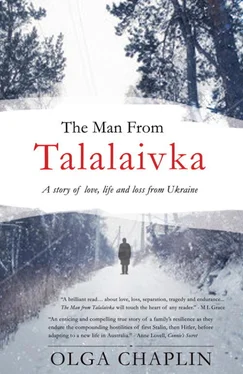He stood frozen, shoulders still stiff and proud, holding up a tired body now racked with even more uncertainties. “What possible reason could the police have to interview me, separately?” he wondered. His mind quickly tore through possible misdemeanours of these past four years in the camp. His only crime—if it could be called one—was the tiny clandestine cellar beneath the floorboards of their crowded living space, dug out with his bare hands and lined with waste timber, in which he stored precious supplies of cabbage and green apples to help his family, particularly Ola, survive the winters and springs of camp rations. And he could not allow his mind to dwell on the only truly significant ‘misdemeanour’ of fact, of his and Evdokia’s origins. Their survival as a family depended on this. “God!” he cried inwardly. “Tell me these new blisters won’t come to naught! Evdokia needs our few feniks for her trunk of worldly goods—if we are to be approved!”
Caught off guard, he looked up in a moment of bewilderment as he sought an answer from Above. No Word came to him. Only the music responded: teasing, playful, as the merry-makers, emboldened again, continued their celebrations. He stood there for some moments, trying to make sense of his own situation: the music whirling about him yet pushing him, the outsider, out. The music, his fears, the momentary despair, his pent-up hope—all seemed to collide, like dancers with secret inexplicable steps, each with intriguing goals and outcomes of their own, unconcerned with others’ actions.
Stretched, his nerves jangled, he felt his life was like a macabre dance, the intricate steps of which were not revealed to him until—too late. He turned away from the partying crowd: back to the cramped conditions of his barracks block, his life’s successes and failures flashing before him as he tried to take hold of his emotions, tried desperately not to feel crushed, yet again.
In that moment of truth, as the music faded and the revellers’ laughter receded out of reach, he realised at last that his dance was a dance with destiny: that only the direction of a chance ship would point him to a final home. Yet even now at this one last, late moment, one slip, one wrong step, could still take them out of safety, back eastwards, to an unthinkable Siberian oblivion.

Chapter 37
Ajag of lightning slashed across the sombre sky, awakening tree-tips of the gorge in crystal candles like a premature Christmas mass. Peter jerked awake, stunned by nature’s revelatory force, then leaned back in his carriage seat. The Black Forest was so dense, the hills and mountains so steep above the lurching train as it headed southward to Switzerland’s border. Instinctively, he felt for the vital documents in his coat’s chest pocket and sighed in relief. Across from him, Nadia and Ola slept folded within Evdokia’s arms; Mykola slumped next to him, succumbing at last to the day’s long journey.
He closed his eyes as the lightning flashed again in the dusky night, heavy snowfalls slowing the train to a near-crawl as it wended its way on elliptical bends. He carefully retrieved the precious documents and re-read their simple contents, still felt a sense of disbelief. From the moment he was ordered to present himself to Administration Headquarters for interrogation, miraculous wheels of action were set in motion. Police records were incomplete, inconclusive. Someone, a stranger who must have dogged him, and now recently disappeared, had assumed his identity.
The Cold War undercurrents, even espionage, thrived on these transient political systems, as east and west Europe struggled for political advantage. The camp commandant, aware of Peter’s precarious position, stood alongside him at the tribunal and produced the vital document, long hidden in his archives, authenticating Peter’s transfer from the Wilhelmshaven to Heidenau camps those four long years ago; further, he appealed to his friend, the Kreis Harburg Burgermeister, as witness. The final authorisation was signed, approval stamped. Peter, with heart pounding in the charged moments, was handed the two life-changing documents which allowed him and his family to leave Heidenau camp, and Germany.
As if a magician’s cloth had ripped away uncertainty, within the few rushed weeks inoculations were completed, Evdokia’s trunk sealed, heartfelt farewells shared with those still languishing in the camp. In the heightened tensions and frenetic arrangements, Peter still could not know which country would take them, the choices limiting: his concerns of damp climates affecting Ola’s health were confirmed by the camp doctor, his own fear of Stalinism, and of Cold War repercussions, made his eyes look afar.
Lightning flashes flicked on and off Evdokia and their daughters’ slumbering faces, ghostly, yet ethereal, in their heavy dark coats generously given by others for their journey. “God,” he prayed silently, hands clammy from inner tension he hid so well from his family and those about him, “give us strength to come through this unscarred… keep Ola well for our ship from Naples!” They were heading to their port of embarkation, their final destination still unknown. Borys and Hryhori had already left in their America-bound ship, migration to that country increasingly competitive, and the quota for displaced persons almost full. Canada, Brazil and other destinations, were less inviting. Above all else, he needed to be among people who believed in democracy and who had respect for the rule of law. And Ola’s health had to be accommodated. If America could not take them, they would go to another country that was equally fair in political and geographical climate.
He gazed up in wonder at the night sky, its vast blackness dotted with gently falling snow. The fir trees bordering the snow-covered rail tracks were being shrouded in feathered cloaks anew, becoming the night’s battalions of mystical guardians which were guiding this migration train to its ultimate destination.

Chapter 38
“Ah!” Peter braced himself as he splashed his face with the icy water and blotted it with thick towelling, thankful that his reflection in the large ornate mirror was now less gaunt. His eyes skirted the capacious marbled bathroom of this grand old hotel, their temporary home these past months, paused as he noted the shrapnel pock-marks along the walls, the legacy of Naples’ pitched fighting in the war, ostensibly long-since gone, that set country, village and neighbour against each other in the madness of extreme idealism and aggression.
He stepped onto the terrace and smiled as Nadia and Ola, who were oblivious to an adult’s concerns, sang and danced in their child’s play. He leaned on the marbled balustrade. “My God,” he marvelled, “this was a place for kings!” The lofty location, far enough away from the city noise and bustle, was well-placed to meet their daily needs. The view was expansive, yet serene: a long sliver of Mediterranean blue-greens merging gently with hazy azure sky, the hillsides and villa gardens covered in foliage of recovering olive and citrus trees, unrepentantly hiding recent scarring of wartime bombs. He sighed, savouring the tranquillity of this setting.
He reached into his pocket for the tobacco, then paused. He would not open this rationed pouch; he would need it to barter for citrus and vegetables. Ola’s wellbeing depended on these. He watched as she played, still pale and underweight, but active enough after the last injection. “Thank God these officials have good authority,” he thought, viewing the seemingly innocent setting of the metropolis, now harbouring infectious diseases, as ships came and went and as migrants from all over Europe congregated in cramped city spaces. In an unprecedented move, the IRO commander had ordered last-minute inoculations for the most vulnerable, Ola among them.
Читать дальше













